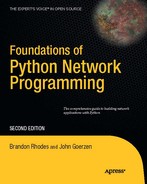This book owes its very existence to John Goerzen, whose work in writing the first edition of Foundations of Python Network Programming indeed provided the foundation on which this volume has been built. The excellent example he set by supplying complete, working example programs has guided me at every step. Where his examples were not obsolete, I have worked to retain his source code so that it can benefit another generation of readers.
The editorial team at Apress provided ample support during this experience—my first attempt at revising something the length of an entire book—and the quality of the result is in large part thanks to Laurin Becker's gentle encouragement, Michael R. Bernstein's very knowledgeable technical reviews, and Matt Wade's holding the rudder to keep each chapter on course. Michael's reviews, in particular, were a model of what an author needs: frequent encouragement when a chapter has gone well, tips and links to more information when coverage of a topic is sketchy, and frank dismay when part of a chapter has gone off the rails. Several parts of this book that will please readers will do so because their first draft was not adequate, and Michael suggested the direction in which the chapter needed to move instead.
And, of course, the copy editors and layout people all did much work as well, and I want to thank Mary Ann Fugate in particular for imposing her good taste about when to use "which" and when to use "that," which (that?) has produced much smoother English.
Every reader of this book should join me in thanking the Python core developers and the community that has grown up around Python for every single tool, routine, and function referenced in this book. And as John Goerzen did in the first edition's acknowledgments, I want to express gratitude to the early generations of programmers like Richard Stallman, who demonstrated that programming could be an open, happy, and cooperative discipline that did not impose the physical world's economics of scarcity onto the world of freely copied programs. To those who prefer more negative forms of protest, I offer Joss Whedon's mantra about creativity: "The greatest expression of rebellion is joy."
And, finally, I would like to thank my mother for letting me spend enough time in front of the computer when I was growing up, and my father for raising me in a house with shelves of books about Unix. He chose an AT&T 3B1 as our home computer. While other students in grade school were learning about the abysmal world of DOS, I was learning about awk, C, and multi-processing—background that prepared me to appreciate Python's beauty the moment I saw it.
Brandon Craig Rhodes
Midtown Atlanta
19 November 2010
